 Petzlover
Petzlover Kaikadi is originated from India but Kishu is originated from Japan. Kaikadi may grow 11 cm / 4 inches shorter than Kishu. Kaikadi may weigh 6 kg / 13 pounds lesser than Kishu. Both Kaikadi and Kishu has almost same life span. Kaikadi may have more litter size than Kishu. Kaikadi requires Low Maintenance. But Kishu requires Moderate Maintenance
Kaikadi is originated from India but Kishu is originated from Japan. Kaikadi may grow 11 cm / 4 inches shorter than Kishu. Kaikadi may weigh 6 kg / 13 pounds lesser than Kishu. Both Kaikadi and Kishu has almost same life span. Kaikadi may have more litter size than Kishu. Kaikadi requires Low Maintenance. But Kishu requires Moderate Maintenance
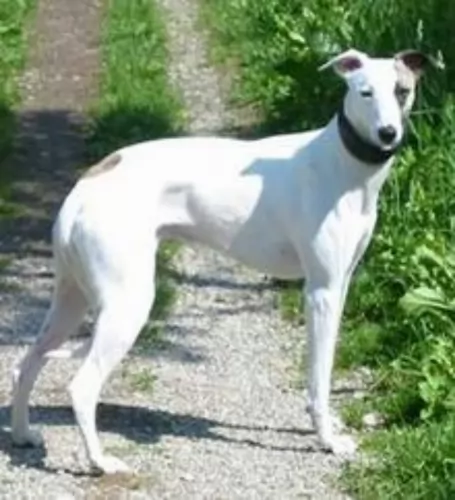 The Kaikadi or Kai Kadi is a terrier dog, hailing from India. Not much is available on the history of the dog, but today you won't easily find original Kai Kadi in India. This is because they have essentially been mixed with stray dogs of India as well as Pariah.
The Kaikadi or Kai Kadi is a terrier dog, hailing from India. Not much is available on the history of the dog, but today you won't easily find original Kai Kadi in India. This is because they have essentially been mixed with stray dogs of India as well as Pariah.
It is for this reason that the dog isn't recognized as a standardized breed by any of the leading kennel clubs.
 The Kishu is a Spitz type hunting dog that originates from Japan. Many people believe he is a descendant of the wolf. Those who have studied the dog say that it has kept its genetic purity and that there has been very little cross breeding with other dogs.
The Kishu is a Spitz type hunting dog that originates from Japan. Many people believe he is a descendant of the wolf. Those who have studied the dog say that it has kept its genetic purity and that there has been very little cross breeding with other dogs.
The Kishu is also known as the Kumano Ken, a name given after the area the dog originated from. The breed was officially recognized and standardized in 1934, and is known as the Kishu Ken. In 1934 the dog was also designated a Living Natural Monument in Japan and is protected by law.
The dog is also included in the group ‘Asian Spitz and Related Breeds’ class of primitive dogs.
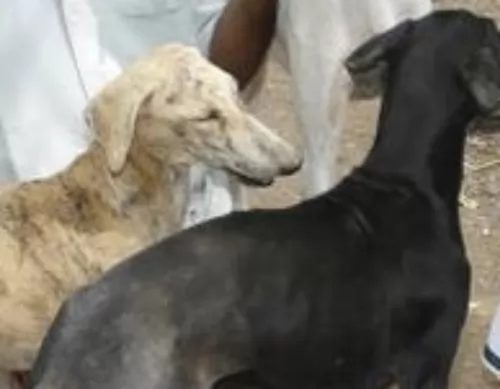 These dog have always been used for hunting, guarding and herding in India and today he makes a good watchdog, watching over his human family.
These dog have always been used for hunting, guarding and herding in India and today he makes a good watchdog, watching over his human family.
It's not a large dog though and he stands at roughly 35 to 45cm in height and weighs 17 to 21kg. He is lean and muscular, looking similar to the Italian Greyhound or Whippet.
He has a short smooth coat and the color can be patterned white, tan and black. The head is long and thin, as are the legs, and his tail is long and thin too. The floppy ears stand erect when alert.
The Kaikadi is an affectionate, alert, energetic dog. He won't do well in a city environment with a tiny garden as he requires a large garden to run in.
He is a dog that will need to be trained and socialized if you want him to be obedient and to get on well with children in the home as well as pets.
He can be a fairly quiet, docile dog inside but outside when there is a game to be had, he becomes lively and animated. They are quite sensitive, so while they get on well with children in the home, he won’t respond well to large families with lots of rowdy, undisciplined children as it makes him anxious.
 The Kishu is a medium sized dog standing between 43 – 56cm in height and weight is between 14 – 27kg.
The Kishu is a medium sized dog standing between 43 – 56cm in height and weight is between 14 – 27kg.
He has a short, straight double coat which can be white, red or brindle. The dog has minimal shedding, making him an easy dog to groom.
The nose of the dog is black, but particularly with the white coated dogs, the nose can be brownish or pink in color. The ears are erect and pointed forwards and the tail is carried slightly curved over the dog's back.
The docile Kishu is no pushover and he is a strong minded, courageous dog. He is also an amicable dog breed, getting on well with his human family as well as with other dogs in the home.
He is somewhat aloof and reserved around strangers. Even though he is a docile dog, it is a good idea to have him trained and socialized so that he can be obedient and balanced in all situations.
He is intelligent and learns easily. An interesting aspect with the Kishu Ken is that he likes to take in everything going on from a vantage point, often seeking out a higher spot from where he can look about.
Kishu Kens like to keep an eye on whatever is going on, and sometimes he looks for a high place so that he can survey everything. They can be aloof or shy around strangers.
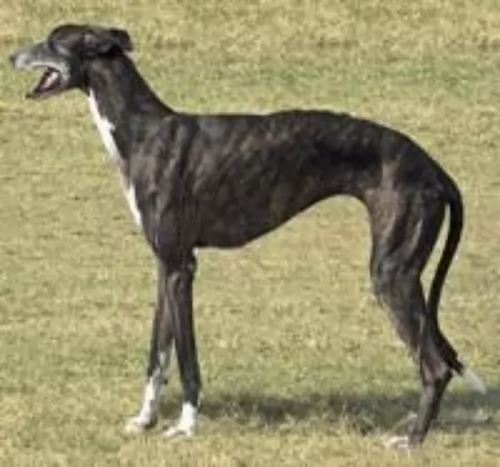 Your Kai Kadi loves running and playing outside, after all he has always been a hunting dog. He will love to spend time with you outside playing.
Your Kai Kadi loves running and playing outside, after all he has always been a hunting dog. He will love to spend time with you outside playing.
The Kaikadi is a low maintenance dog too. Provide your Kaikadi with everything that makes a dog happy and in exchange you’ll get yourself a loyal, loving pet who wants to be your friend.
 The Kishu is a hardy dog breed known for his exceptional hunting instincts and loyalty. He is a brave, clever, playful, tenacious dog eager to please his master.
The Kishu is a hardy dog breed known for his exceptional hunting instincts and loyalty. He is a brave, clever, playful, tenacious dog eager to please his master.
He isn’t so much a hunting dog anymore but is essentially a companion dog, bonding closely with his human family. He will get on well with children and pets in the home, but more so when he has been trained and socialized.
Apart from making a splendid companion, the Kishu promises to be an excellent guard dog to anyone who threatens his human family.
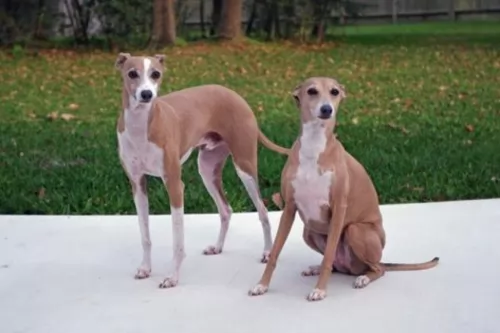 When you’ve got a Kai Kadi, make sure you understand some of the health risks that come along. This is a healthy dog breed so you’re not likely to have much going wrong with him, but you need to know that he can get sick and then you need to have the name of a good vet for medical treatment -
When you’ve got a Kai Kadi, make sure you understand some of the health risks that come along. This is a healthy dog breed so you’re not likely to have much going wrong with him, but you need to know that he can get sick and then you need to have the name of a good vet for medical treatment -
A sudden drop in blood sugar, which is many times brought on by stress, can make your dog lethargic and even have slight tremors in the face. It could be a hypoglycemic attack. See the vet immediately.
The pancreatitis can become inflamed and your dog could be vomiting, have diarrhea and have abdominal pain. There are quite a few things that can cause pancreatitis such as obesity, infection as well as stress.
 Before you bring a new puppy or rescue dog into your home, you must be prepared for the responsibility of a dog. If you're just simply looking for a watchdog to stick into your backyard, you're being cruel.
Before you bring a new puppy or rescue dog into your home, you must be prepared for the responsibility of a dog. If you're just simply looking for a watchdog to stick into your backyard, you're being cruel.
A dog is a social creature and you need to spend time with them and care for them. Sometimes he can get sick and then you may need to get him to the vet.
Some of the illnesses your Kishu can get will be easily treatable, while others may be life-threatening and require surgery.
The health of your dog will depend a lot on the food you provide it with as well as your lifestyle. Common dog health problems can range from typical eye- and ear infections to bloat, hip dysplasia and cancers.
The thyroid gland doesn’t produce enough thyroid hormone which can lead to other health problems such as tiredness and weight gain. A daily thyroid pill from the vet can help sort this issue out.
This is a common health problem, seen more in older dogs. Your once active dog will move around slower and battle to stand up after lying down.
Arthritis can’t be cured but you can alleviate the pain and suffering. Your vet will tell you that diet and nutrition are important factors to ward off arthritis in the first place.
If your dog has arthritis and is in pain, get him to your vet who can prescribe medications to alleviate the symptoms.
This is a respiratory infection which can be transmitted from one dog to another. You’ll notice coughing, tiredness, runny nose and watery eyes and loss of appetite. Take him to your vet who will know what to do to speed up recovery for your pet.
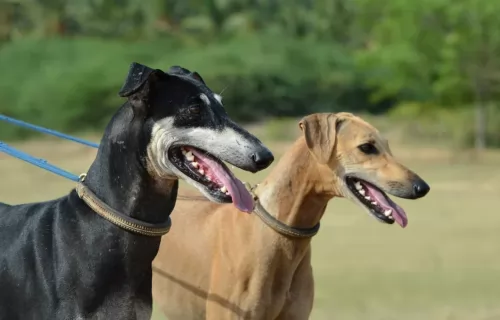 Owning a dog is a responsibility, requiring you to look after a living being just like you would any family member of yours, otherwise why get a dog in the first place?
Owning a dog is a responsibility, requiring you to look after a living being just like you would any family member of yours, otherwise why get a dog in the first place?
You may want a dog for watchdog purposes, but as a living creature, it is important to develop a relationship with your pet and to show him that you love and appreciate him.
There are many things to do to ensure you have a healthy, happy 4-legged canine member in your household
Make sure he has fresh, cool water available to him around the clock.
Provide him with a warm, dry place to sleep.
Provide him with wholesome food to maintain health. There are many excellent commercially manufactured foods on the market. Buy one according to the size and energy levels of your pet. Try to sometimes add cooked home-made food into his kibble such as cooked chicken, brown rice and vegetables as well as some raw meat from time to time. This diet is guaranteed to keep your pet mentally and physically well.
Check your pets nails, ears and eyes regularly. He should be checked for fleas and ticks when you brush him twice a week. Have him examined by a veterinarian as soon as you suspect something is amiss with him. Keep him up to date with his vaccinations.
The Kaikadi is an energetic dog so make sure that you provide him with the opportunity to be exercised. Take him on walks or hikes, play ball and rope games with him and go swimming with him to ensure he remains lean and muscular.
Have him trained and socialized as it takes off the rough-edges of a dog.
 The Kishu will need to be brushed twice a week to keep the coat free of dust and loose hairs. Their ears should be checked regularly too for wax build up and dirt as ear infections are a common dog illness.
The Kishu will need to be brushed twice a week to keep the coat free of dust and loose hairs. Their ears should be checked regularly too for wax build up and dirt as ear infections are a common dog illness.
Their nails should also be trimmed regularly. Take him regularly to have his teeth cleaned because dental problems can put his entire body at risk for disease.
The Kishu needs a good sized garden to roam. He is best suited to country life because he needs regular exercise. If he lives in the city, put him on a leash and take him for walks.
Apart from exercise, good food is imperative as nutritious food contributes to longevity. Top quality food and the right size portions can ensure lean, energetic, happy, healthy dogs.
Take trouble to understand the ingredients listed on the commercial dog food packaging. Generally the low quality, processed commercial foods are inflammatory.
Even if you go for the top brand kibble, don’t just provide your pet with dry kibble night after night. Mix in some cooked chicken, brown rice and vegetables.
Remember too, that fresh whole foods such as vegetables have live enzymes and are packed full of fiber which is so necessary for digestion. A good diet with fresh, cool water is guaranteed to provide an excellent dimension to your pet’s health.